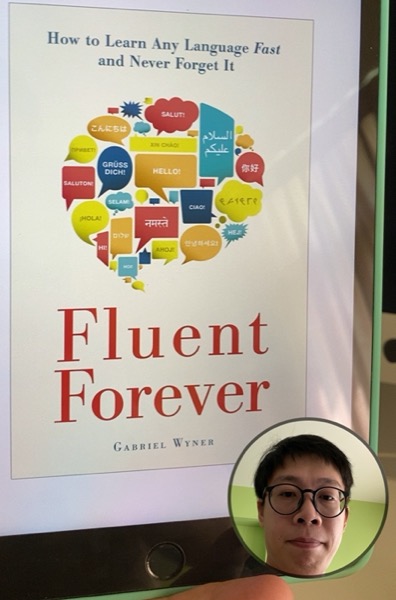During Circuit Breaker, I took up an interest with language learning, partly for my kids, and partly for myself hoping I can understand Korean dramas 😄.
Last week I read How we learn, where the book is generic to what you are learning. This week I finished Fluent Forever, which is geared towards learning a new language.
While the book is 400 pages long, the last 50% is appendix material, listing the resources and elaborating on how to make flash cards.
I quote the author:
This book is about many things: … But when you get down to brass tacks, it’s about learning languages with flash cards.
Yes. Good old flash cards.
Disclaimer: he sells his flash card app, similar to Duolingo’s Tinycards.
Nonetheless it is a good book that I have learnt quite a bit.
Basic of language learning
The three basic keys to language learning:
- Learn pronunciation first
- Don’t translate
- Use Spaced Repetition Systems (SRS)
I like the point on Do NOT Translate. When we learn a foreign language, we always try to translate from our native language. That’s bad because it slows down how you recall, and therefore making you less fluent in conversation.
Materials needed
A flash card app with SRS (such as Anki) will be your core tool.
But you still need these:
- Grammar book - learn the rules of spelling and forming sentences
- Frequency dictionary - the 1,000 most important and common words
- Phrasebooks (eg. Lonely Planet) - useful basic sentences
- Pronunciation guide/app
- Google Translate
You may still attend classes, or have online tutor eg. italki.com.
Learn the most common words
He provided the first 625 words in thematic order. DIY your deck from that.
IPA (skip this)
IPA is a standard for sound. All languages can use IPA for indicating how a word should be pronounced. Search “IPA for YOUR_LANGUAGE”.
WARNING: IPA is very HARD, because of the weird symbols, and there are sounds you would have never spoken before.
Good to know, but I think it is not necessary to learn IPA. Kids learn without ever knowing IPA.
Grammar book
A grammar book is a must have. To be fluent, you must know about the rules and sentence structure.
Learn the grammar, but need not go too deep.
Grammar is recognizing certain patterns:
- new words
- word forms
- word orders
Make use of a grammar book to break down examples into 1 of the above pattern.
Once your see the patterns, they will become very helpful. eg. key prefixes, suffixes
Mnemonics tips
The basic ingredients to creating a deep memory: spelling + sound + meaning + personal connection
The special ingredient:
When forming images, it helps to have a dirty mind… memorable: jokes and sex…
To come up with a memorable image for nouns is easy, but not so for other types of words.
- Verb: Person or action
- Adjective: Object
- Adverb: Action
You don’t always need mnemonics. Sometimes, the language spelling already tells the pattern easily.
Creating your personal flashcards
The process itself is very important – writing/typing the word, choosing an image. It is part of deep learning.
Even the process of choosing what cards to put in your deck is important.
my personal decks are useless to anyone but myself
So, while you can take inspiration from someone’s else deck, do not copy-and-paste.
Build your deck from scratch slowly, adding words only when you are ready to learn.
Fill in the __ type of flashcard
Some words are abstract eg. by
To learn abstract words, the flashcard could have cloze kind of statements. The prompt on the front side could have a “hint”.
My homework was eaten _____ my dog.
Along with a picture of a dog, the flashcard would help to learn the word “by”.
Resources
- Forvo: Free, native-speaker recordings of more than 1.5 million words in 300 languages.
- RhinoSpike: Upload text, get back audio (paid)
- Lang-8: Community based. You help them, they help you. Q&A platform app.
- Frequency List (wiki) Most common used words
- Language Difficulty eg. English -> Chinese/Jap/Kor is the HARDEST
At times, a foreign language can feel like a mask. It’s a game of make-believe. You’re playing the role of Some French Guy.
